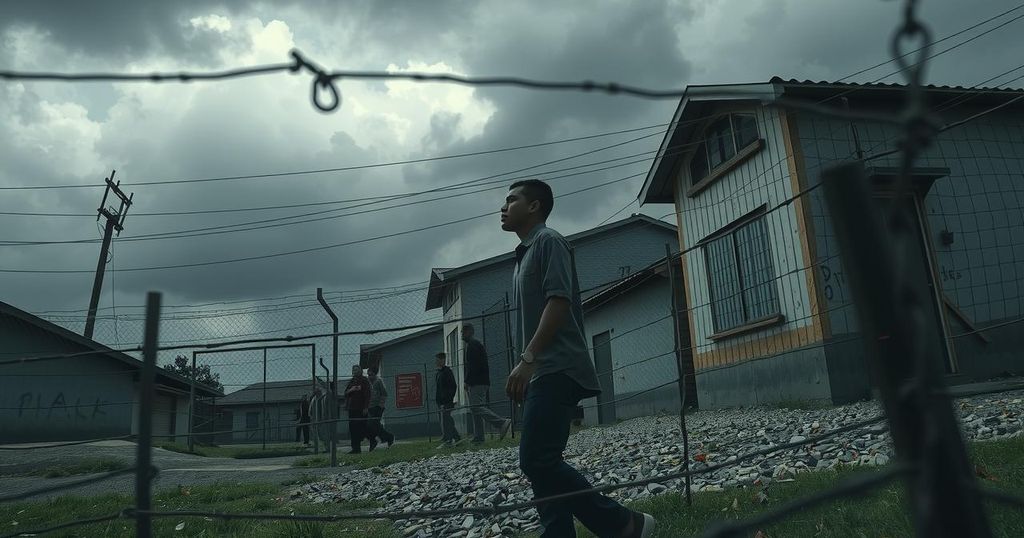Elections
Politics
AMERICAN CIVIL LIBERTIES UNION, AND, ASIA, CUBA, DONALD TRUMP, DRUG TRAFFICKING, EL SALVADOR, JOHN ADAMS, MIGRATION, NORTH AMERICA, ORGANIZED CRIME, PHILIPPINES, POLITICS, ROMERO, SAN DIEGO, SOUTH AMERICA, TREN, TREN DE ARA, TREN DE ARAGUA, TRUMP, U. S, UNITED STATES, US, VENEZUELA
Omar El-Sharif
Key Insights into Trump’s Deportation of Venezuelan Migrants under the Alien Enemies Act
President Trump recently invoked the Alien Enemies Act to deport over 130 Venezuelans to El Salvador, targeting the Tren de Aragua gang. This controversial action has faced legal challenges, notably by the ACLU, leading to a judicial order halting the deportations. Despite this, some deportation flights proceeded, raising questions about compliance with court rulings and the broader implications for U.S. immigration policy.
On March 14, President Donald Trump utilized the Alien Enemies Act of 1798 to deport over 130 Venezuelans to a prison in El Salvador. He justified this action against the Tren de Aragua gang, which he has inaccurately linked to an invasion of criminal immigrants. Notably, this law has only been invoked three times before in U.S. history, primarily during major conflicts such as the War of 1812 and the world wars.
The Trump administration has increasingly framed the migrant crisis as a war, officially designating eight Latin American criminal groups as foreign terrorist organizations. Immigration authorities identify possible members of Tren de Aragua through various gang-related identifiers, some of which include tattoos and specific clothing styles, such as Chicago Bulls jerseys and particular urban streetwear, as noted in legal documents filed by the American Civil Liberties Union.
Andry José Hernández Romero, a Venezuelan makeup artist, fled his home country due to political repression and persecution for his sexual orientation. He attempted to immigrate to the U.S. for a better life but was detained in a California center where authorities questioned him about his tattoos, including crowns on his wrists, which he claimed had personal meanings unrelated to gangs. He was subsequently moved to a facility in Texas before the mass deportations began.
In early March, flights were prepared to deport Venezuelans to El Salvador, revealing an unusual pattern of Saturday flights for such actions. As the situation escalated, detainees at the El Valle Detention Facility were unexpectedly awakened and informed of their impending deportation, only to see cancellations and legal actions arise in opposition to these deportations. Advocacy groups rushed to file legal petitions to halt the removals based on concerns regarding wrongful gang affiliations.
A federal judge, James E. Boasberg, responded to these legal challenges by issuing a temporary restraining order to halt deportations under the Alien Enemies Act. However, ICE Air planes had already taken off with a mixed group of deportees, leading to further complications, as some planes did not comply with the court’s order to return.
The Trump administration is seeking Supreme Court approval to continue deportations of Venezuelan migrants under the Alien Enemies Act, with potential implications for compliance with existing court orders. Meanwhile, the status of Romero and other detained individuals remains precarious as legal battles and administrative actions unfold.
The situation surrounding the deportation of Venezuelan migrants under the Alien Enemies Act highlights significant legal and humanitarian challenges. The enforcement of ancient laws in contemporary contexts raises questions about due process and the treatment of immigrants. Advocacy groups continue to fight against potential wrongful deportations, while the legal proceedings evolve in response to the government’s actions. President Trump’s controversial approach signals ongoing tensions surrounding immigration policy in the United States.
Original Source: www.usnews.com








Post Comment